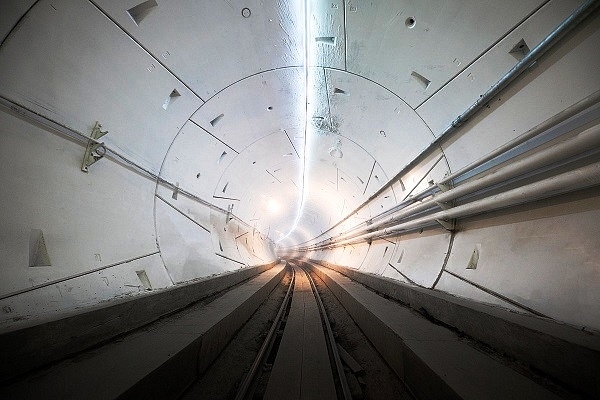
Future Of Public Transport? Elon Musk’s Boring Company To Unveil Its First Subterranean Transportation Tunnel
Tech entrepreneur Elon Musk's Boring Company is all set to unveil its first subterranean transportation tunnel that can move people faster than freeways, USA Today has reported.
An impressive poster was shared by Musk as a build up to the event:
Musk is likely to demonstrate how autonomous cars will carry people through the 3.2 km test tunnel constructed under the streets of Hawthorne, California, also home to SpaceX headquarters. He is also planning to unveil elevators that will let users bring their own cars from street level to the tunnel.
Two years ago, Musk announced on Twitter that ‘traffic was driving him nuts’ and he was “going to build a tunnel boring machine and just start digging.”
The Hawthorne test tunnel has been developed more as a ‘proof of concept’ and a research and development project of The Boring Company's tunnelling and public transportation systems division.
The prototype that will be unveiled is a tunnel based transportation system called loop, which is based on a variant of another transportation concept known as hyperloop that Musk first presented in 2013 through a paper.
The concept of the loop has similarities with hyperloop but with one major difference.
While Hyperloop draws a vacuum inside the tube to eliminate air friction, Loop is used for shorter routes when there is no technical need to eliminate air friction.
Loop is envisioned as a high-speed underground public transportation system in which passengers are transported on autonomous electric skates travelling at 125-150 miles per hour. Electric skates will carry between 8 and 16 passengers (public transportation), or a single passenger vehicle.
The company believes that traditional tunnels are really expensive to dig, with some projects costing as much as $1 billion per mile and hopes to make a tunnel network feasible by reducing costs by a factor of more than 10.
The company plans to drastically bring down the tunnelling cost by 3-4 times by reducing the diameter for a one-lane tunnel to 14 feet from the current standard of 28 feet.
Modified electric vehicles with alignment wheels or placing vehicles on stabilised electric skates will run on the tunnel. The company is also working to significantly increase the speed of the Tunnel Boring Machine (TBM).
The company has also been selected to construct a high-speed transport line that would connect downtown Chicago to O’Hare airport. The Chicago tunnel, which will be more than 17 miles long, is estimated to cost $1 billion to construct and the entire project will be privately funded, with no subsidies from taxpayers. The tunnel is expected to be operational in 18-24 months after the initial digging.
The company’s another test tunnel on Los Angeles' west side was scrapped last month (November) after neighbourhood groups filed a lawsuit expressing concerns about traffic and disruptions from trucks hauling out dirt during the boring process.
Also Read: What The Boring Company Now Has In Store For Mass Transit